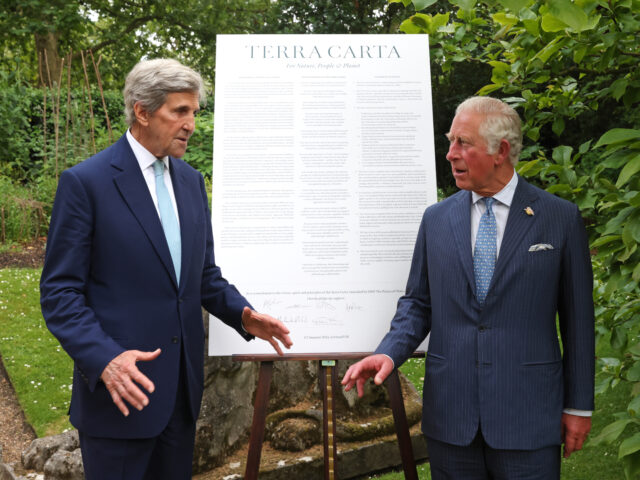Failed presidential candidate John Kerry has urged King Charles III to attend the United Nations COP27 climate change conference in Egypt after it was revealed that Prime Minister Rishi Sunak will not travel to the meeting because he is too busy.
John Kerry, who serves as President Joe Biden’s special envoy on climate change on the international stage, has said that it would be “very powerful” if King Charles joins the globalist meeting in Sharm el Sheikh next month to help push the green agenda in light of the British Monarch’s vocal history on the issue.
“I know that his being there would make a difference… because he has credibility, because he’s been a long-term leader,” Kerry told Sky News. “I think it would be very powerful.”
Last year, the then-Prince Charles attended the COP26 meeting in Glasgow, Scotland, which both he and Boris Johnson travelled to by private jet despite being close enough to opt for more environmentally friendly modes of transportation.
In a speech delivered at the conference, Charles said that climate change presented a greater threat to humanity than the Chinese coronavirus, and therefore the nations of the world should “put ourselves on what might be called a war-like footing,” to combat the supposed looming catastrophe.
The King has long been a proponent of radical government intervention in the economy to stop the climate from changing, however, in his first address to the nation following the death of his mother, Queen Elizabeth II, the King said that he would step back from his activist endeavours and observe the political neutrality that is expected of his station.
It was reported earlier this month, however, that he had actually planned to attend the COP27 meeting and once again deliver a speech, but was convinced by then-Prime Minister Liz Truss to abandon the plans.
While it is not clear at the time of this reporting if any similar discussion has taken place between King Charles and Rishi Sunak, it has been revealed that the newly installed prime minister will not be attending the meeting himself, with Downing Street saying that it is a “recognition of other pressing domestic commitments, including preparations for the autumn budget”.
A Number 10 spokesman said that while Sunak will not be attending, other senior government officials, including the United Kingdom’s COP26 president Alok Sharma, will go instead. The spokesman also stressed that this does not mean that Sunak would be sidelining the green agenda.
“The government and prime minister remain absolutely committed to supporting Cop27 and to leading international action to tackle climate change,” she said. “We remain committed to net zero and to leading international and domestic action to tackle climate change. The UK is forging ahead of many other countries on net zero.”
The move was hailed by former Business Secretary Jacob Rees-Mogg, who resigned from his post earlier this week, who said: “The Prime Minister is right not to go to COP. The cost of living won’t be solved in Sharm el Sheikh where each hotel room for the conference is £2,000 a night.”
Yet, much like his former boss, Boris Johnson, Sunak has been a leading figure in the globalist wing of the Conservative Party in promoting green ideology, using one of his first acts as Prime Minister this week to reverse a decision of Liz Truss and reimpose the ban on fracking for shale gas.
This came despite a report this week from the Joint Committee on National Security Strategy (JCNSS), which warned that the radical pursuit to transition to a “net zero” carbon emitting economy by the year 2050 will result in Britain “becoming increasingly reliant on electricity and renewable energy sources, which are more vulnerable to extreme weather than gas and other fossil fuels.”
While the United Kingdom only imports around 4 per cent of its natural gas from Russia, the failure of successive governments to tap into the domestic resources of the country, it has been vulnerable to price shocks in the European markets and therefore runs the risk of experiencing blackouts this winter like other more Russia-dependent nations.
Follow Kurt Zindulka on Twitter here @KurtZindulka

COMMENTS
Please let us know if you're having issues with commenting.